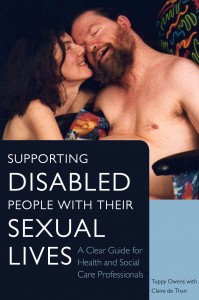Tuppy Owens, author of Supporting Disabled People with their Sexual Lives, has worked with and supported disabled people for over 35 years. She is the founder of Outsiders, a group providing peer support and dating opportunities for physically and socially disabled people, handles the Sex and Disability Helpline, and set up the Sexual Health and Disability Alliance (SHADA) for health and social care professionals. In this article, Tuppy examines how our attitudes towards the sexuality of disabled people have changed over the years, and shares some success stories she has witnessed as part of her work.
Listening to Disabled People’s Personal Desires, Taking them Seriously, and Supporting them in their Journeys to Fulfillment
The past few decades, it has become increasingly difficult for disabled people to enjoy sexual expression, either alone, with partners or commercially. Back in the old days, things were laiséee faire. Assisted masturbation was often offered by nurses and staff. There was an adventurous, experimental attitude to sex, and no strict regulations about prostitution. I am told a residence in Sussex for wounded World War Two veterans operated brothel-style!
We now live in an era of transparency and risk assessment; one nurse described it to me as residential homes operating in a liability and blame culture, with loss of person-centred care, of which sexuality is at the heart. Only some health professionals are allowed or prepared to attach sex toys to the genitals of a disabled resident who is unable to pleasure themselves. Nobody has come up with a toy which the individual could activate themselves in the middle of the night without help, but I’m working on it.
Thankfully, more disabled people can go to accessible clubs and bars, and more of them are in work: all places where they may find a partner. However, today most people use online dating, which is frought with difficulties. Disability dating sites sadly attract preditors and are unsafe to use, unless, like Outsiders, applicants are carefully vetted. Many residences have single rooms and don’t allow bed-hopping or residents to share.
A leading disability publication published an article in the 90’s stating that prostitution is illegal in Britain (which it’s not, and never has been in Britain) and then a false rumour circulated that the 2005 Sexual Offences Act criminalised supporting another person to find a sex worker, saying that it was “procurement”. People who should know better still come up with this nonsense. With that and the over-inflated publicity on trafficking, and threats of criminalising the buying of sex, few health professionals or local authorities will entertain their residents, patients or clients gaining the many benefits of a sex session with a professional.
What else holds health and social care professionals back? My book Supporting Disabled People in their Sexual Lives, published by Jessica Kingsley Publishers on 19th November, looks at the issues in depth, as I have been engaging with disabled people to support them in their various sexual needs for over thirty years, in the Outsiders Club. Basically, as my book says over and over again, our governing bodies do not offer training, guidelines or policies on sex and disability. Myself and Lorna Couldrick, another long term activist, managed to get a short paragraph on the topic on the Royal College of Nursing website this year. SHADA, the Sex and Disability Alliance, which I run, is starting a project to change things around with the governing bodies. But I expect it will be a long battle, especially in the medical arena.
Our laws against discrimination make it illegal NOT to support disabled people to enjoy the same pleasures as others in the privacy of their own homes.
Many disabled people have received worse than useless sex education. Their sexuality so ignored, that their body confidence, sexual confidence and overall sense of wellbeing may be at rock bottom. Some feel their body does not belong to them, as it has only been poked and operated on by doctors. Privacy may have been been denied them. Having been abused, bullied, teased and sexually rejected, they may feel they are on the social scrap heap. They need a great deal of support to climb out of this hole, using body image therapy and sessions to discover what pleasures their bodies are capable of feeling, and to catch up on missed teenage experimentation.
Mat Fraser has worked really hard on himself and his ‘thalidomide arms”, and he’s come a long way. He was photographed naked by Ashley Savage in one of Ashleys’s photo shoots designed to empower the subject and make them look sexy and strong. Mat learned Karate, became a drummer in a rock band and trained as an actor. All these things built up his sexual self confidence. He became the presenter at our fund-raising events, and even did his own striptease act, removing false arms and showing his real ones. He learned to love his own arms. Now he is married to one of New York’s top erotic performers and the two of them starred in “The Beauty and the Beast” which toured Britain this year.
really hard on himself and his ‘thalidomide arms”, and he’s come a long way. He was photographed naked by Ashley Savage in one of Ashleys’s photo shoots designed to empower the subject and make them look sexy and strong. Mat learned Karate, became a drummer in a rock band and trained as an actor. All these things built up his sexual self confidence. He became the presenter at our fund-raising events, and even did his own striptease act, removing false arms and showing his real ones. He learned to love his own arms. Now he is married to one of New York’s top erotic performers and the two of them starred in “The Beauty and the Beast” which toured Britain this year. Mat has now become a Patron of the Outsiders Trust.
Mat has now become a Patron of the Outsiders Trust.
One of our other patrons, Diego Soto-Miranda, severely impaired with spinal atrophy, gave us an excellent tip on how to bring a companion into your life, as a masturbation aide, lover and partner;
“Finding a lover/partner is all about maximising circumstance:
- make them laugh
- be very polite, and
- figure out what they want and give it to them.
A wheelchair does not come into the equation. Few say they want someone to climb Everest with them. Usually, they want respect, appreciation, someone to listen, but overall the best aphrodisiac is laughter. Make her/him feel like the centre of the universe.”
Diego worked on his own self confidence to work this one out and put it into practice. He is Brazilian, which might help! In Brazil, flirting and sex are taken seriously. It’s time we started taking such things seriously here.
Tuppy Owens
The Outsiders Trust
Our websites:
You can find out more about Tuppy’s book here.
Hello,
I work in the disability sector in Australia and am interested in purchasing Tuppy’s book. However, when I looked for postal charges, there was no reference to Australia. I am a bit confused – your site indicates you’ll post to Afghanistan, but not to Australia?
Thank you,
Jan Lang
Hi Jan, thanks for your comment. We are experiencing a few hiccups with our new website, but we absolutely do deliver to Australia, and you can order directly from our Australian distributor here: http://www.footprint.com.au/product-detail.asp?SubSection=Jessica+Kingsley+Publishers+&product=9781849053969&ParentPage=product-listing%2Easp%3Fkeywords%3D%26scope%3D%26Category%3D I hope that answers your question!